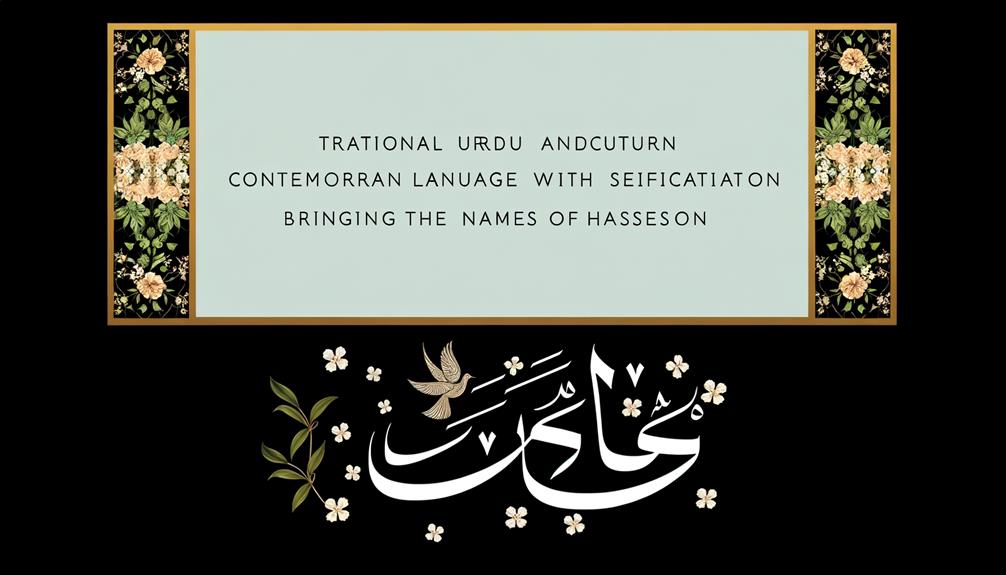Hafsa Name Meaning in Urdu and English
The name Hafsa, derived from Arabic roots, holds deep cultural and historical significance. In Urdu, Hafsa means 'young lioness' or 'gatherer,' symbolizing strength and wisdom.
In English, it reflects qualities such as courage, leadership, resilience, and nurturing capabilities. Historically, Hafsa is associated with Hafsa bint Umar, a prominent figure in Islamic tradition entrusted with safeguarding the original Quran manuscript.
This name signifies exceptional qualities of intelligence, compassion, and strong will. Those interested in exploring the deeper cultural and historical contexts will find an enriching narrative encompassed within the name Hafsa.

Key Takeaways
- In Urdu, Hafsa means 'young lioness' or 'gatherer,' symbolizing strength and wisdom.
- In English, Hafsa denotes courage, unity, strength, resilience, leadership, and nurturing capabilities.
- The name Hafsa is derived from the Arabic root reflecting accumulation and preservation.
- Hafsa is associated with historical and religious figures like Hafsa bint Umar.
- Spelling variations of Hafsa include Hafsah, Hafzah, and Hafza, reflecting regional dialects.
Origin of the Name Hafsa
The name Hafsa has its origins in Arabic culture and is historically significant within Islamic tradition.
Etymologically, Hafsa is derived from the Arabic root 'ح ف ص' (ḥ-f-ṣ), meaning 'to gather' or 'to collect.' This linguistic root underscores a sense of accumulation and preservation, which resonates deeply within the cultural context.
The name is commonly used in Arabic-speaking regions, reflecting its intrinsic connection to the linguistic and cultural heritage of these areas. Additionally, Hafsa is a feminine given name, emphasizing its role in denoting specific attributes and qualities associated with women.
Understanding its etymological background provides insight into the cultural and linguistic nuances that have shaped its significance over centuries.
Hafsa in Islamic Tradition
Hafsa holds significant importance in Islamic tradition, primarily due to her association with key historical and religious figures. Evidently, Hafsa bint Umar was the daughter of Umar ibn al-Khattab, the second Caliph of Islam, and one of the wives of the Prophet Muhammad, earning her the revered title of 'Mother of the Believers.'
Her intellectual contributions are noteworthy; she was entrusted with the safekeeping of the original manuscript of the Quran during the Caliphate of Uthman ibn Affan. This underscores her pivotal role in the preservation and transmission of Islamic teachings.
Her life and legacy continue to be a source of inspiration and reverence within the Muslim community, reflecting her esteemed position in Islamic history.
Meaning of Hafsa in Urdu
In Urdu, the name 'Hafsa' carries both historical and cultural significance, often interpreted as 'young lioness' or 'gatherer,' reflecting attributes of strength and wisdom.
The name is deeply rooted in Islamic history, associated prominently with Hafsa bint Umar, a revered figure known for her intelligence and resilience. This etymological background imbues the name with a sense of honor and respect in Urdu-speaking communities.
The connotations of a 'young lioness' symbolize bravery and leadership, while 'gatherer' suggests an individual who brings people together, emphasizing communal harmony. These meanings resonate profoundly within the cultural context, making the name 'Hafsa' not just a personal identifier but a symbol of esteemed qualities and virtues.
Meaning of Hafsa in English
Within the English language, 'Hafsa' is often interpreted as 'young lioness' or 'gatherer,' denoting characteristics of courage and unity. The name emanates a sense of strength and resilience, qualities synonymous with a lioness. This interpretation underscores an individual who exemplifies bravery in the face of challenges.
Additionally, the term 'gatherer' suggests an ability to bring people together, fostering community and cooperation. These attributes make 'Hafsa' a name that conveys both leadership and nurturing capabilities.
Historical Figures Named Hafsa
The name's rich connotations of strength and unity are further exemplified through various historical figures who have borne the name Hafsa, leaving impactful legacies across different cultures and eras.
Among the most notable is Hafsa bint Umar, the daughter of the second Caliph Umar ibn al-Khattab and a wife of the Prophet Muhammad. Her role in early Islamic history is profound, as she safeguarded one of the earliest written copies of the Quran.
Another distinguished figure is Hafsa Sultan, the influential mother of Ottoman Sultan Suleiman the Magnificent. Her political acumen and philanthropic efforts notably shaped the Ottoman Empire.
These examples underscore the name Hafsa's association with leadership, wisdom, and historical prominence.
Cultural Significance of Hafsa
Examining the cultural importance of the name Hafsa reveals its deep-rooted presence in various societies, symbolizing attributes such as strength, wisdom, and leadership.
Historically, the name Hafsa finds its origins in Islamic culture, prominently associated with Hafsa bint Umar, a revered figure known for her stewardship and intellect. Her role as a custodian of the Quran underscores the name's connotation with knowledge and responsibility.
In contemporary contexts, Hafsa is celebrated across diverse Muslim communities, reflecting an enduring respect for its historical and spiritual undertones. The name's ability to convey resilience and guidance has guaranteed its persistent relevance, making it a powerful cultural emblem that continues to inspire and connect individuals within these communities.
Popularity of the Name Hafsa
The popularity of the name Hafsa has experienced notable fluctuations over recent years, influenced by both current name trends and its profound cultural significance.
Examining contemporary naming patterns reveals an increasing preference for names with historical and religious connotations, of which Hafsa is a prime example.
This trend underscores the enduring appeal of names that carry rich cultural heritage and meaningful legacies.
Current Name Trends
In recent years, the name Hafsa has seen a notable rise in popularity, particularly within communities that value its cultural and historical significance. This trend can be attributed to several factors:
- Cultural Reclamation: As individuals seek to reconnect with their heritage, names like Hafsa that carry deep-rooted historical importance are increasingly chosen.
- Modern Appeal: The name Hafsa resonates with contemporary parents for its unique yet accessible phonetic structure, making it a balanced choice.
- Influence of Media: The portrayal of characters named Hafsa in literature, films, and media has contributed to its rising favorability.
This growing preference underscores a broader movement toward names that offer both traditional resonance and modern appeal.
Cultural Name Significance
Understanding the cultural significance of the name Hafsa requires exploring its historical roots and the values it embodies within various communities. Originating from Arabic, Hafsa holds considerable weight, especially within Islamic tradition, as it was the name of one of the Prophet Muhammad's wives, revered for her intelligence and piety.
This historical context enriches the name with a legacy of respect and esteem. In contemporary times, the name Hafsa maintains its popularity, particularly in Muslim-majority countries and among diaspora communities. Its consistent use signifies a cultural continuity and a connection to heritage and religious identity.
The name's enduring appeal underscores its role as both a personal identifier and a bearer of cultural and historical narratives.
Pronunciation and Spelling
Understanding the correct pronunciation and spelling of the name Hafsa is essential for accurate communication and cultural respect.
The name is typically pronounced as 'Haf-sa,' with emphasis on the first syllable.
Common spelling variations include Hafsah and Hafzah, which may arise due to transliteration from Arabic script.
Correct Pronunciation Guide
Pronouncing the name 'Hafsa' correctly involves emphasizing the initial syllable, with a soft 'a' sound as in 'father' and a short, crisp 'sa' at the end. Achieving precise pronunciation is crucial to maintain the name's cultural and phonetic integrity.
Here's a detailed guide:
- Initial Syllable Emphasis: Begin with a notable 'Haf' where 'H' is pronounced with a breathy sound.
- Soft 'a' Sound: Ensure the 'a' in 'Haf' mimics the sound found in 'father,' avoiding a hard or elongated vowel.
- Crisp 'sa' Ending: Conclude with a succinct 'sa,' ensuring the 's' is sharp and the 'a' is brief.
Understanding these nuances allows for a respectful and precise use of the name.
Common Spelling Variations
The name 'Hafsa' can be found in several spelling variations, such as 'Hafsah,' 'Hafzah,' and 'Hafza,' each of which may slightly alter its pronunciation and cultural interpretation. These variations stem from transliteration differences when converting Arabic script into Latin script, influenced by regional dialects and phonetic nuances.
'Hafsah' retains a closer phonetic alignment to the original Arabic, while 'Hafzah' and 'Hafza' may reflect localized pronunciations. Understanding these variations is essential for appreciating the name's cultural richness and historical significance, particularly in Muslim communities.
While the core meaning remains consistent, recognizing these differences enhances linguistic accuracy and fosters greater cultural sensitivity in name usage.
Qualities Associated With Hafsa
Many qualities associated with the name Hafsa reflect a blend of strength, intelligence, and compassion. This name, rooted in rich cultural and historical backgrounds, often signifies a person who embodies resilience and wisdom. Analyzing the etymology and historical figures bearing this name, several key traits emerge:
- Strength: Individuals named Hafsa are often perceived as strong-willed and resilient, capable of overcoming challenges with determination.
- Intelligence: The name is associated with a sharp intellect and a love for learning, reflecting a deep-seated curiosity and analytical mindset.
- Compassion: Compassion and empathy are notable qualities, indicating a person who is considerate and understanding towards others.
These attributes collectively highlight the multifaceted nature of the name Hafsa.
Conclusion
To sum up, the name Hafsa carries significant historical, cultural, and religious connotations. Originating from Arabic roots, it is revered in Islamic tradition and is associated with notable historical figures.
The meaning of Hafsa in both Urdu and English conveys qualities of strength and beauty. The name's cultural significance extends beyond linguistic boundaries, reflecting its widespread popularity. Pronunciation and spelling remain consistent, enhancing its universal appeal.
Overall, Hafsa embodies a blend of tradition, significance, and enduring charm.






